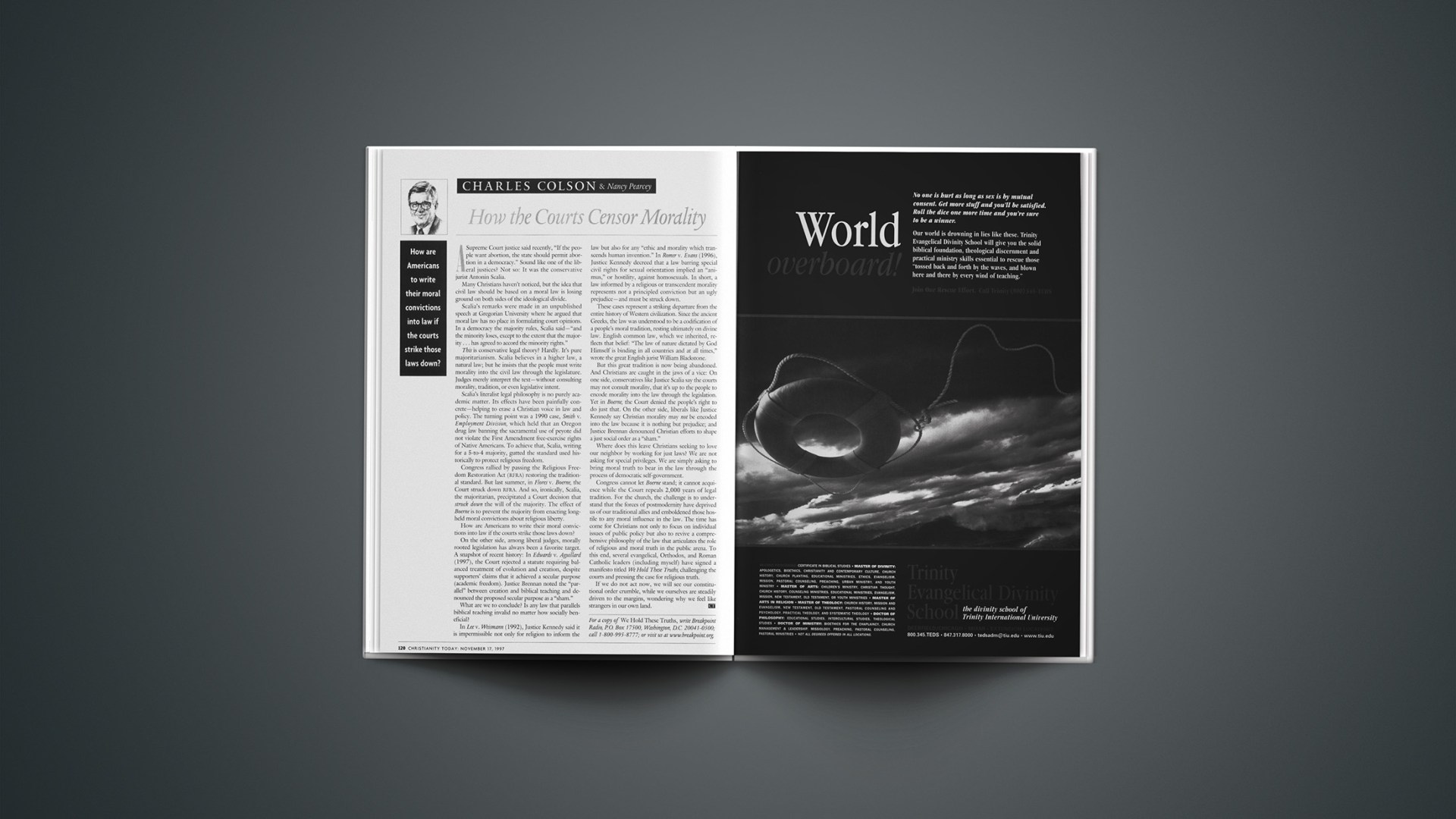A Supreme Court justice said recently, “If the people want abortion, the state should permit abortion in a democracy.” Sound like one of the liberal justices? Not so: It was the conservative jurist Antonin Scalia.
Many Christians haven’t noticed, but the idea that civil law should be based on a moral law is losing ground on both sides of the ideological divide.
Scalia’s remarks were made in an unpublished speech at Gregorian University where he argued that moral law has no place in formulating court opinions. In a democracy the majority rules, Scalia said—”and the minority loses, except to the extent that the majority … has agreed to accord the minority rights.”
This is conservative legal theory? Hardly. It’s pure majoritarianism. Scalia believes in a higher law, a natural law; but he insists that the people must write morality into the civil law through the legislature. Judges merely interpret the text—without consulting morality, tradition, or even legislative intent.
Scalia’s literalist legal philosophy is no purely academic matter. Its effects have been painfully concrete—helping to erase a Christian voice in law and policy. The turning point was a 1990 case, Smith v. Employment Division, which held that an Oregon drug law banning the sacramental use of peyote did not violate the First Amendment free-exercise rights of Native Americans. To achieve that, Scalia, writing for a 5-to-4 majority, gutted the standard used historically to protect religious freedom.
Congress rallied by passing the Religious Freedom Restoration Act (RFRA) restoring the traditional standard. But last summer, in Flores v. Boerne, the Court struck down RFRA. And so, ironically, Scalia, the majoritarian, precipitated a Court decision that struck down the will of the majority. The effect of Boerne is to prevent the majority from enacting long-held moral convictions about religious liberty.
How are Americans to write their moral convictions into law if the courts strike those laws down?
On the other side, among liberal judges, morally rooted legislation has always been a favorite target. A snapshot of recent history: In Edwards v. Aguillard (1997), the Court rejected a statute requiring balanced treatment of evolution and creation, despite supporters’ claims that it achieved a secular purpose (academic freedom). Justice Brennan noted the “parallel” between creation and biblical teaching and denounced the proposed secular purpose as a “sham.”
What are we to conclude? Is any law that parallels biblical teaching invalid no matter how socially beneficial?
In Lee v. Weismann (1992), Justice Kennedy said it is impermissible not only for religion to inform the law but also for any “ethic and morality which transcends human invention.” In Romer v. Evans (1996), Justice Kennedy decreed that a law barring special civil rights for sexual orientation implied an “animus,” or hostility, against homosexuals. In short, a law informed by a religious or transcendent morality represents not a principled conviction but an ugly prejudice—and must be struck down.
These cases represent a striking departure from the entire history of Western civilization. Since the ancient Greeks, the law was understood to be a codification of a people’s moral tradition, resting ultimately on divine law. English common law, which we inherited, reflects that belief: “The law of nature dictated by God Himself is binding in all countries and at all times,” wrote the great English jurist William Blackstone.
But this great tradition is now being abandoned. And Christians are caught in the jaws of a vice: On one side, conservatives like Justice Scalia say the courts may not consult morality, that it’s up to the people to encode morality into the law through the legislation. Yet in Boerne, the Court denied the people’s right to do just that. On the other side, liberals like Justice Kennedy say Christian morality may not be encoded into the law because it is nothing but prejudice; and Justice Brennan denounced Christian efforts to shape a just social order as a “sham.”
Where does this leave Christians seeking to love our neighbor by working for just laws? We are not asking for special privileges. We are simply asking to bring moral truth to bear in the law through the process of democratic self-government.
Congress cannot let Boerne stand; it cannot acquiesce while the Court repeals 2,000 years of legal tradition. For the church, the challenge is to understand that the forces of postmodernity have deprived us of our traditional allies and emboldened those hostile to any moral influence in the law. The time has come for Christians not only to focus on individual issues of public policy but also to revive a comprehensive philosophy of the law that articulates the role of religious and moral truth in the public arena. To this end, several evangelical, Orthodox, and Roman Catholic leaders (including myself) have signed a manifesto titled We Hold These Truths, challenging the courts and pressing the case for religious truth.
If we do not act now, we will see our constitutional order crumble, while we ourselves are steadily driven to the margins, wondering why we feel like strangers in our own land.
For a copy of We Hold These Truths, write Breakpoint Radio, P.O. Box 17500, Washington, D.C. 20041-0500; call 1-800-995-8777; or visit us at www.breakpoint.org.
Copyright © 1997 Christianity Today. Click for reprint information.










